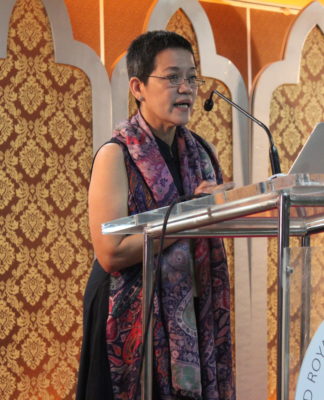GLORIA Ramirez, 78 years old, sits quietly at the dinner table surrounded by her children and grandchildren when she suddenly turns to her eldest daughter and shouts, “Who are you? What are you doing here?” Ramirez is not experiencing a momentary memory lapse, she is in the severe stage of Alzheimer’s disease (AD).
Named after German psychiatrist Alois Alzheimer, AD is a neurological disorder characterized by slow and progressive memory loss caused by the gradual destruction of the brain cells. It was first described in 1906 by Alzheimer, who found two abnormal structures in the brain of a woman afflicted with dementia, a progressive decline in the cognitive function of the brain beyond what is expected of normal aging.
According to Dr. Encarnita Ampil, a neurologist at the UST Hospital, AD is the most common cause of dementia among the elderly. According to a 2005 United Kingdom study, more than 24.3 million people worldwide have dementia and 4.6 million new cases are diagnosed each year.
“Patients with AD are unable to recall recent events. They do not know where they are or even if it is night or day. They may also become agitated, violent, and irritable,” Ampil said.
AD can be mild, moderate, or severe depending on the degradation of the individual’s cognition, behavior, and function. It is characterized by forgetfulness and changes in language, understanding, brain function, and behavior.
The mild stage is manifested by forgetfulness and the inability to organize and sequence events. In the moderate and severe stages of AD, language and behavior are affected. The stages differ from one another depending on the degree of brain cell destruction the individual experiences. Ampil said that it usually takes nine years for the disease to progress from mild to severe, although there is no specific time frame for the transition from one stage to the next.
Most AD cases are sporadic, meaning a person without a family history of the disease can acquire it. The normal onset of the disease for these individuals is between 60 to 65 years old. But there are also familial cases of the disease, which affect less than 10 per cent of AD patients, who are at age 45. This kind of AD is caused by genetic mutations of chromosomes 1, 14, and 2, which when inherited, will make a person vulnerable to the disease.
Zestful life
Gloria was diagnosed with AD in 1998. Since then, her family and friends have tried to keep her active by encouraging her to continue her normal activities.
“We take long walks with her and let her do the activities that she can still do on her own as long as she is safe,” Betty Ramirez, the eldest daughter of Gloria, said.
Betty is thankful that they had discovered their mom’s AD condition early. “It was good that we found out sooner as we were able to provide the best care we could possibly give her,” she said.
Ampil said that once symptoms of the disease manifested, it is best for patients to seek medical help immediately in order to properly diagnose the disease.
Although there is no specific test to detect AD, it can be diagnosed by the doctor through the patient’s clinical history and examination. “We use laboratory tests and brain imaging only as adjuncts in diagnosis so we have to carefully consider all the data before we can conclude that the patient has AD,” she said.
Patients with AD can still live an active life with the help of medications like Donezepil, Galantamine, and Rivastigmine that inhibit the action of acetylcholinesterase, an enzyme that destroys acetylcholine—one of the chemicals that nerve cells use to communicate stimuli.
“What we target in patients with AD is the improvement of the quality of their lives so that the years they spend with their families are still enjoyable,” Ampil said.
Ampil said that although AD cannot be prevented, the elderly are encouraged to keep their minds active by playing board games, gardening, reading, and watching television, among others. And because individuals with AD are forgetful and disoriented, they must be accompanied when attending social gatherings or church activities.though AD is incurable, Gloria Ramirez is still living a good and active life thanks to the love, compassion and tolerance of her family and friends, the best medication there is.
















